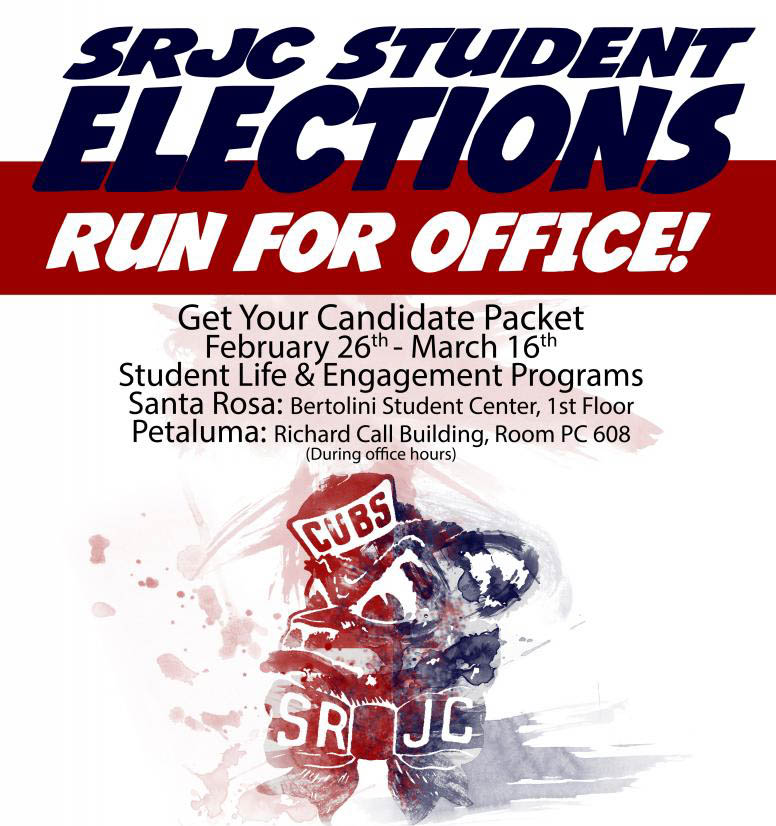It’s election season at Santa Rosa Junior College. The Student Government Assembly (SGA) has officially started accepting applications to run for office for the next academic school year.
Students interested in running can pick up application packets in the student affairs offices at both the Santa Rosa and Petaluma campuses. Interested students are encouraged to apply and speak with student government adviser Zack Miranda before the 5 p.m. March 16 deadline.
A full list of officer positions are available in the election packets, as well as a brief description of the duties and expectations for each role.
To be considered for candidacy, applicants must be enrolled in at least 5 units, maintain a 2.0 GPA and attend at least one informational meeting prior to the deadline. After a list of candidates is released, campaigning will begin March 19 and voting will take place April 16-20.
Some students expressed concerns that only especially active members of the student body could run for an SGA position. Miranda wanted to assure everyone that anyone can run for office.
Miranda said, “There is no reason that it has to be that way at all, we do plenty of training, any student– absolutely any student, is right for this position and can do these positions; I truly believe that.”
“To a degree, I feel like clubs are a stepping stone into getting involved and so you’re bound to have some folks that have done a little bit at the college first,” Miranda said.
Miranda is especially excited at the prospect of a more active and lively campaign season this year.
“I do feel like it’s really accessible to anybody, but the hardest part is really knowing about it and being willing to put yourself out there, because it is a competition,” Miranda said. “It’s so much better; so many more students are engaged when there are more students running.”
The past two years have seen incredibly low voting numbers when measured against a student body of roughly 26,000. This year the SGA hopes to increase student participation through outreach and increased exposure; visiting classrooms and engaging with the student body.
When addressing the question of how to tackle this issue, Vice President of Committees, Eduardo Juarez said, “Those are questions that we need to be asking administrators. I am student rep and I have influence. Now let’s take that influence to meetings with them and ask them those questions. That’s how I see it.”
After the application process closes on March 16, detailed bios of all candidates will be made available online so that students can get to know who may one day be speaking on their behalf.
“Get to know who’s running, because these people are the ones who are going to make decisions for you,” Juarez said.
Student Trustee Robert Martinez stressed the importance of a more informed student population on SGA matters.
“I’m making decisions for people who have never met me,” Martinez said. “I’m making decisions that will affect their education that don’t know my name, don’t know I exist. That’s not OK. There’s only so much I can do. I can go out to classes, but not everyone knows me and that’s not a good thing.”
Martinez, who is the honorary student representative on the Board of Trustees, said the lack of student engagement with school politics can make his job difficult.
“At a board meeting, that is where the final decision for every single thing is made and I am that student voice,” Martinez said. “It’s hard for me to do my job when I don’t know what students think.”
Perhaps the biggest change to this year’s election is in how slates will be regulated for candidates who wish to pool resources. In previous years there was no limit to the number of people who could be on a slate.
“What has happened in the past is that you would get two really big slates that have upwards of 10 to 13 on them, going head to head and everyone else that isn’t in a slate gets pushed aside because it’s two bigger slates just going head to head with each other,” Martinez said.
In the 2016 elections, the two largest slates faced allegations of misconduct, which resulted in a special re-election that had even fewer votes than the initial election.
In testament to what the SGA represents, Martinez, who had originally joined student government as the Assembly Member of Disability Affairs said, “I joined to help people with disabilities and then I expanded from there to just wanting to help more people.”
All eligible students can run for any of the 14 available positions within the SGA. Students are not required to have previous experience in government or related fields. Miranda said he strongly encourages any student with a desire to affect change within the institution make a bid for one of the officer positions before the March 16 deadline.
The SGA Bylaws give an in-depth outline of what the officers do as representatives of the students.


